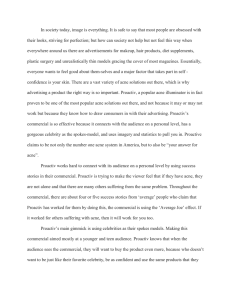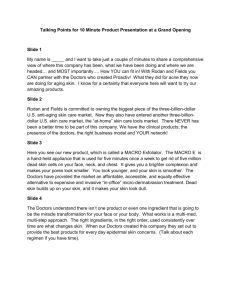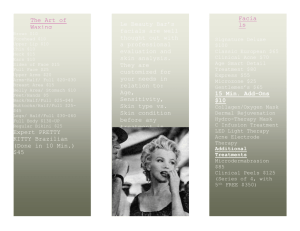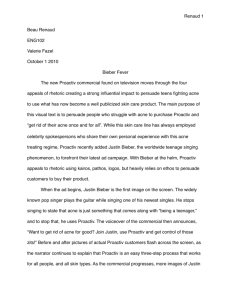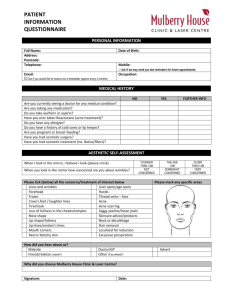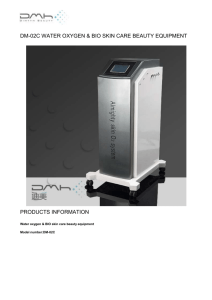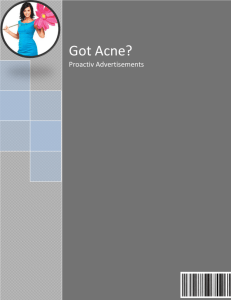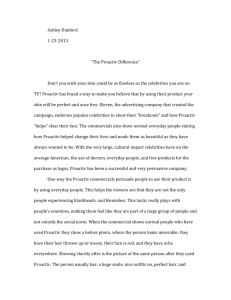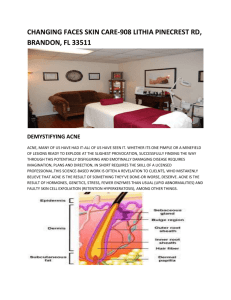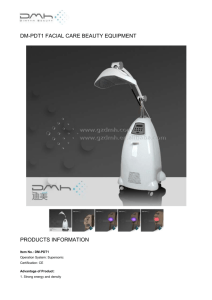Source Analysis Outline Example
advertisement
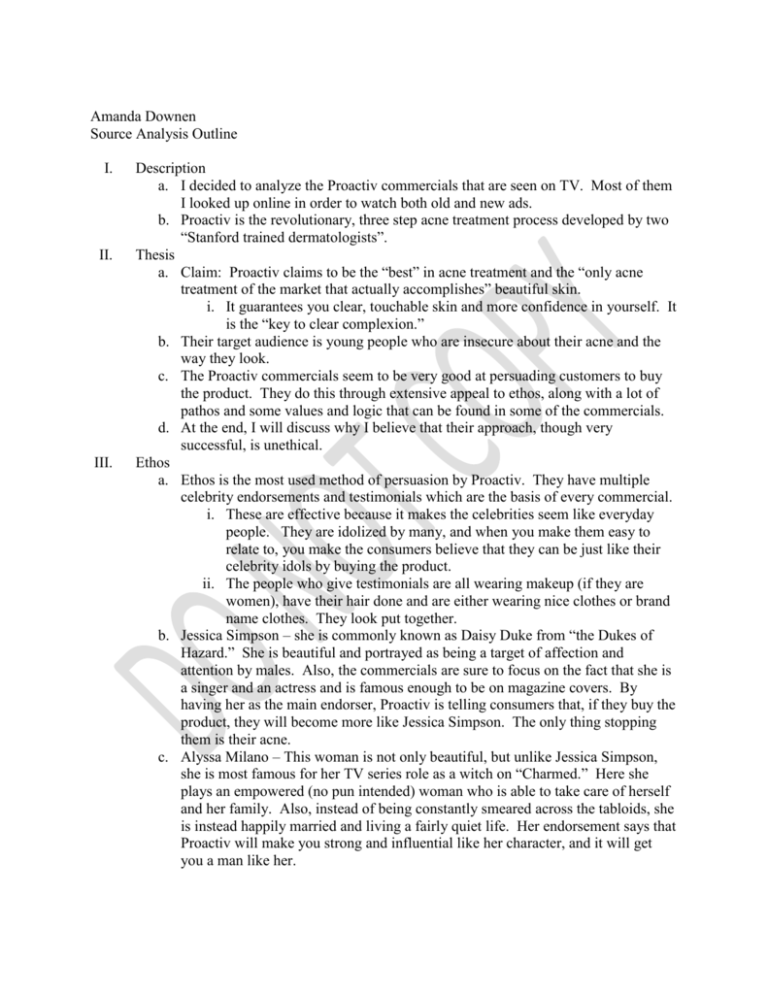
Amanda Downen Source Analysis Outline I. II. III. Description a. I decided to analyze the Proactiv commercials that are seen on TV. Most of them I looked up online in order to watch both old and new ads. b. Proactiv is the revolutionary, three step acne treatment process developed by two “Stanford trained dermatologists”. Thesis a. Claim: Proactiv claims to be the “best” in acne treatment and the “only acne treatment of the market that actually accomplishes” beautiful skin. i. It guarantees you clear, touchable skin and more confidence in yourself. It is the “key to clear complexion.” b. Their target audience is young people who are insecure about their acne and the way they look. c. The Proactiv commercials seem to be very good at persuading customers to buy the product. They do this through extensive appeal to ethos, along with a lot of pathos and some values and logic that can be found in some of the commercials. d. At the end, I will discuss why I believe that their approach, though very successful, is unethical. Ethos a. Ethos is the most used method of persuasion by Proactiv. They have multiple celebrity endorsements and testimonials which are the basis of every commercial. i. These are effective because it makes the celebrities seem like everyday people. They are idolized by many, and when you make them easy to relate to, you make the consumers believe that they can be just like their celebrity idols by buying the product. ii. The people who give testimonials are all wearing makeup (if they are women), have their hair done and are either wearing nice clothes or brand name clothes. They look put together. b. Jessica Simpson – she is commonly known as Daisy Duke from “the Dukes of Hazard.” She is beautiful and portrayed as being a target of affection and attention by males. Also, the commercials are sure to focus on the fact that she is a singer and an actress and is famous enough to be on magazine covers. By having her as the main endorser, Proactiv is telling consumers that, if they buy the product, they will become more like Jessica Simpson. The only thing stopping them is their acne. c. Alyssa Milano – This woman is not only beautiful, but unlike Jessica Simpson, she is most famous for her TV series role as a witch on “Charmed.” Here she plays an empowered (no pun intended) woman who is able to take care of herself and her family. Also, instead of being constantly smeared across the tabloids, she is instead happily married and living a fairly quiet life. Her endorsement says that Proactiv will make you strong and influential like her character, and it will get you a man like her. IV. d. Lindsey Lohan and Avril Lavigne – These two women represent the “rebel” demographic of consumers. They appeal to the group which has a tendency/life goal/motto of not following trends. With their endorsement, it is ok for the people with this outlook to fall into line and buy Proactiv. e. P Diddy – Having P Diddy as an endorser covers the male demographic of consumers. He is incredibly successful as a record producer, rapper, actor, men’s fashion designer, entrepreneur, music video producer and dancer. He has won Grammys and MTV Music Video Awards and even an award for his clothing line. P Diddy is estimated at a net worth of over $350 million. Again, the message here is that if you use Proactiv, you will become like P Diddy; successful and rich. f. Ryan Sheckler – This is a kid who became a pro skateboarder at the age of 13 and is now the star of his own reality show. He is the idol of countless child and teenage skaters. His endorsement makes these kinds want to use Proactiv, because their hero uses it. g. Kind of as a side, I came across a commercial with Jennifer Love Hewitt and Jessica Simpson speaking Mandarin. The commercial was aired in China. I thought it was funny because most Americans wouldn’t recognize a Chinese celebrity if they saw her endorsing a product on TV. This shows how much Asia strives to be like America, where we live lavishly and have so many benefits. By having two famous, beautiful, American celebrities endorsing Proactiv, it sends the message that they can live more like Americans if they buy it. h. Also, there is ethos in the fact that they state that Proactiv was created by Stanford-trained, board-certified and still-practicing dermatologists. All of these adjectives describing the creators urge consumers to trust in them. They went to Stanford, a school of high prestige. They are board-certified, so a group of their peers deemed them worthy of our trust. And, they are still practicing, meaning that they haven’t been shamed into retirement through a failed product or some lawsuit. i. The credibility that is supplied through all of these people is only somewhat valid. The celebrity endorsements are definitely not reliable – they are being paid to talk about the product. Also, they more than likely are using other products and regimens to keep themselves looking good. The credibility of the product creators is, on the other hand, valid. They would not be able to claim their credentials without legal implications. Pathos a. Marketed as the “best” acne treatment, the “only acne treatment on the market that actually accomplishes” beautiful skin. i. These claims make it difficult for customers to switch to another product even if Proactiv doesn’t work great for them. They are under the impression that their acne is as good as it will ever get. ii. This also creates a fear of switching to a new acne treatment. If Proactiv is the “best” and the “only,” then anything else will only work less and make the acne worse. b. All of the commercials claim that “help is on the way.” This suggests that you are not ok how you are and that you need help c. d. e. f. g. h. V. VI. i. This puts Proactiv in the role of savior and as the answer. The combination of the last two methods is what makes Proactiv customers so loyal to the system. The commercials also guarantee that you will have “clear, touchable skin.” This tells you that your skin is not touchable as it is and has an undertone which suggests that you are not attractive and will not be wanted if you don’t use Proactiv. At the end of each ad there is an offer for money off “if you buy now.” Especially in our economy, this appeals to the people’s need to save money. Or, this could be tempting because, if you save money on this purchase, you’ll have more money to spend on other things. More things = you look rich and everyone wants to look like they make more money than they do. i. ONLY $19.99 with a money back guarantee. 1. Implies that this is a great deal that shouldn’t be passed up and that there is no financial risk, because you can always get your money back. ii. A $72.00 value. Yours for only $19.99! 1. The same as above. This just overstresses the fact that you can’t get a deal like this anywhere else, so don’t miss out. Another appeal to Pathos is that Proactiv makes people believe that they will be happier with it. Many people believe that in order to be happy, they must be rich and beautiful and successful. Through the celebrity endorsements, Proactiv is applying to the importance that we as consumers and non-celebrities place on these three things. They are convincing the consumer that if they use the product, they will be pretty, which will make them successful, which in turn will make them rich and happy. i. This is also an appeal to values. People’s belief that they cannot be happy without money; that money, success and recognition are the most important things in life. Jessica Simpson says, “Problem – Acne. Solution – Proactiv. It’s that simple” i. This appeals to the tendency of people to do as little as they can for the biggest results. Basically, it sounds good to lazy people I don’t think that the connection between the claim and these incited emotions is valid. There is no way to prove that clear skin will make you happier. Also, the fear of switching brands is not legitimate because everybody’s skin will react differently to different brands. Logic a. Proactiv commercials and ads almost always cite the fact that millions of people use the treatment. b. If it is the number one best selling acne system, it must work the best. This is a “band-wagon” approach to persuasion. In a way, it is logical that the product must work really well if so many people us it. That is, if the numbers cited aren’t fabricated. Values a. During one commercial, Julianne Hough (from Dancing with the Stars) is the endorser. At the beginning, she is seen playing with and signing autographs for VII. VIII. little girls. For the consumer, this portrays her as a nice and good person who is worthy of our time. Therefore the product she is backing is a good product and also worth our time. This appeals to the belief that children are our world’s future and so we should be good role models for them b. Also, the commercials ensure us instant gratification. They use words such as “fast,” “instant,” “overnight.” Instant gratification is something that our culture has become very used to and usually expects. It comes from the belief that “time is money.” Validity of the Claim a. I don’t believe that this claim is entirely valid. After a little searching on Google, it is easy to discover that there are more than one kind of bacteria that cause acne. Proactiv, however, only attacks one kind of acne. Therefore, it is not the best system for everybody. b. People don’t know this though, because they take the commercials and ads at face value. They believe what they are being told and don’t expect that the ad is not entirely truthful. After all, it’s endorsed by multiple celebrities and created by prestigious dermatologists. c. The claim, when only applied to the type of acne that it is meant to fight, has been proven to be true. It is a great system which works very well for that type of bacteria. Is the Claim Ethical? a. I believe that the claim is unethical based on the fact that it is just another beauty product which markets itself by making the consumers feel ugly and by making them believe that the product is the only way to be beautiful and lovable. i. This approach is damaging to self image and self confidence. ii. One could argue that this damage is longer lasting and has more of an effect than many physical injuries. 1. You can escape physical pain through medicines. You can escape other people’s opinions of you through walking away. You cannot, however, escape your own opinion of yourself. b. Also, since the claim is not entirely valid and truthful, asserting that it is indeed accurate is unethical. i. The act is lying to customers in order to get them to buy the product. ii. Most people would agree that lying is morally wrong, and therefore unethical.
